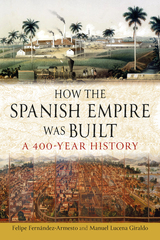756 start with P start with P

At the end of the twentieth century, many fear that the bonds holding civil society together have come undone. Yet, as the noted scholar Dennis Wrong shows us, our generation is not alone in fearing a breakdown of social ties and a descent into violent conflict. Modern masters such as Hobbes, Rousseau, Freud, Mead, Parsons, Marx, Durkheim, and Weber tried to understand what in human nature provokes social cooperation and solidarity and what arouses conflict and chaos.
To minimize discord and promote civility, society must grasp the psychological and sociological elements of human nature involved in attaining that end. The author affords an illuminating perspective on our own efforts to create a well-functioning system that allows for productive and meaningful lives and remains open to change and growth. This important book reveals the individual and social processes that offer potential for reconciliation in the present and the future.

In a major contribution to the theory of perception, A. D. Smith presents a truly original defense of direct realism--the view that in perception we are directly aware of things in the physical world.
The Problem of Perception offers two arguments against direct realism--one concerning illusion, and one concerning hallucination--that no current theory of perception can adequately rebut. Smith then develops a theory of perception that does succeed in answering these arguments; and because these arguments are the only two that present direct realism with serious problems arising from the nature of perception, direct realism emerges here for the first time as an ultimately tenable position within the philosophy of perception.
At the heart of Smith's theory is a new way of drawing the distinction between perception and sensation, along with an unusual treatment of the nature of objects of hallucination. With in-depth reference to both the analytical and the phenomenological literature on perception, and with telling criticism of alternative views, Smith's groundbreaking work will be of value to philosophers of perception in both the analytical and the phenomenological tradition, as well as to psychologists of perception.
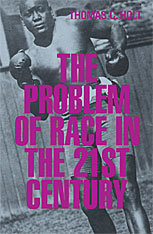
"The problem of the twentieth century is the problem of the color-line," W. E. B. Du Bois wrote in 1903, and his words have proven sadly prophetic. As we enter the twenty-first century, the problem remains--and yet it, and the line that defines it, have shifted in subtle but significant ways. This brief book speaks powerfully to the question of how the circumstances of race and racism have changed in our time--and how these changes will affect our future.
Foremost among the book's concerns are the contradictions and incoherence of a system that idealizes black celebrities in politics, popular culture, and sports even as it diminishes the average African-American citizen. The world of the assembly line, boxer Jack Johnson's career, and The Birth of a Nation come under Holt's scrutiny as he relates the malign progress of race and racism to the loss of industrial jobs and the rise of our modern consumer society. Understanding race as ideology, he describes the processes of consumerism and commodification that have transformed, but not necessarily improved, the place of black citizens in our society.
As disturbing as it is enlightening, this timely work reveals the radical nature of change as it relates to race and its cultural phenomena. It offers conceptual tools and a new way to think and talk about racism as social reality.


Lucien Febvre’s magisterial study of sixteenth century religious and intellectual history, published in 1942, is at long last available in English, in a translation that does it full justice. The book is a modern classic. Febvre, founder with Marc Bloch of the journal Annales, was one of France’s leading historians, a scholar whose field of expertise was the sixteenth century. This book, written late in his career, is regarded as his masterpiece. Despite the subtitle, it is not primarily a study of Rabelais; it is a study of the mental life, the mentalité, of a whole age.
Febvre worked on the book for ten years. His purpose at first was polemical: he set out to demolish the notion that Rabelais was a covert atheist, a freethinker ahead of his time. To expose the anachronism of that view, he proceeded to a close examination of the ideas, information, beliefs, and values of Rabelais and his contemporaries. He combed archives and local records, compendia of popular lore, the work of writers from Luther and Erasmus to Ronsard, the verses of obscure neo-Latin poets. Everything was grist for his mill: books about comets, medical texts, philological treatises, even music and architecture. The result is a work of extraordinary richness of texture, enlivened by a wealth of concrete details—a compelling intellectual portrait of the period by a historian of rare insight, great intelligence, and vast learning.
Febvre wrote with Gallic flair. His style is informal, often witty, at times combative, and colorful almost to a fault. His idiosyncrasies of syntax and vocabulary have defeated many who have tried to read, let alone translate, the French text. Beatrice Gottlieb has succeeded in rendering his prose accurately and readably, conveying a sense of Febvre’s strong, often argumentative personality as well as his brilliantly intuitive feeling for Renaissance France.

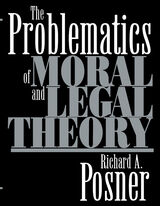
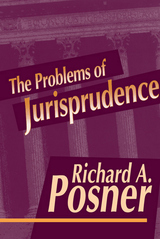
In this book, one of our country’s most distinguished scholar-judges shares with us his vision of the law. For the past two thousand years, the philosophy of law has been dominated by two rival doctrines. One contends that law is more than politics and yields, in the hands of skillful judges, correct answers to even the most difficult legal questions; the other contends that law is politics through and through and that judges wield essentially arbitrary powers. Rejecting these doctrines as too metaphysical in the first instance and too nihilistic in the second, Richard Posner argues for a pragmatic jurisprudence, one that eschews formalism in favor of the factual and the empirical. Laws, he argues, are not abstract, sacred entities, but socially determined goads for shaping behavior to conform with society’s values.
Examining how judges go about making difficult decisions, Posner argues that they cannot rely on either logic or science, but must fall back on a grab bag of informal methods of reasoning that owe less than one might think to legal training and experience. Indeed, he reminds us, the greatest figures in American law have transcended the traditional conceptions of the lawyer’s craft. Robert Jackson did not attend law school and Benjamin Cardozo left before getting a degree. Holmes was neither the most successful of lawyers nor the most lawyerly of judges. Citing these examples, Posner makes a plea for a law that frees itself from excessive insularity and takes all knowledge, practical and theoretical, as grist for its mill.
The pragmatism that Posner espouses implies looking at problems concretely, experimentally, without illusions, with an emphasis on keeping diverse paths of inquiry open, and, above all, with the insistence that social thought and action be evaluated as instruments to desired human goals rather than as ends in themselves. In making his arguments, he discusses notable figures in jurisprudence from Antigone to Ronald Dworkin as well as recent movements ranging from law and economics to civic republicanism, and feminism to libertarianism. All are subjected to Posner’s stringent analysis in a fresh and candid examination of some of the deepest problems presented by the enterprise of law.

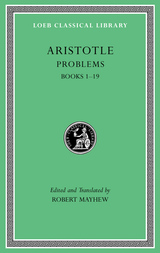
Peripatetic potpourri.
Aristotle of Stagirus (384–322 BC), the great Greek philosopher, researcher, logician, and scholar, studied with Plato at Athens and taught in the Academy (367–347). Subsequently he spent three years in Asia Minor at the court of his former pupil Hermeias, where he married Pythias, one of Hermeias’ relations. After some time at Mitylene, he was appointed in 343/2 by King Philip of Macedon to be tutor of his teen-aged son Alexander. After Philip’s death in 336, Aristotle became head of his own school (of “Peripatetics”), the Lyceum at Athens. Because of anti-Macedonian feeling there after Alexander’s death in 323, he withdrew to Chalcis in Euboea, where he died the following year.
Problems, the third-longest work in the Aristotelian corpus, contains thirty-eight books covering more than 900 problems about living things, meteorology, ethical and intellectual virtues, parts of the human body, and other topics. Although Problems is an accretion of multiple authorship over several centuries, it offers a fascinating technical view of Peripatetic method and thought. Problems, in two volumes, replaces the earlier Loeb edition by Hett, with a text and translation incorporating the latest scholarship.

Aristotle, great Greek philosopher, researcher, reasoner, and writer, born at Stagirus in 384 BCE, was the son of Nicomachus, a physician, and Phaestis. He studied under Plato at Athens and taught there (367–47); subsequently he spent three years at the court of a former pupil, Hermeias, in Asia Minor and at this time married Pythias, one of Hermeias’s relations. After some time at Mitylene, in 343–2 he was appointed by King Philip of Macedon to be tutor of his teen-aged son Alexander. After Philip’s death in 336, Aristotle became head of his own school (of “Peripatetics”), the Lyceum at Athens. Because of anti-Macedonian feeling there after Alexander’s death in 323, he withdrew to Chalcis in Euboea, where he died in 322.Nearly all the works Aristotle prepared for publication are lost; the priceless ones extant are lecture-materials, notes, and memoranda (some are spurious). They can be categorized as follows:I. Practical: Nicomachean Ethics; Great Ethics (Magna Moralia); Eudemian Ethics; Politics; Oeconomica (on the good of the family); Virtues and Vices.
II. Logical: Categories; On Interpretation; Analytics (Prior and Posterior); On Sophistical Refutations; Topica.
III. Physical: Twenty-six works (some suspect) including astronomy, generation and destruction, the senses, memory, sleep, dreams, life, facts about animals, etc.
IV. Metaphysics: on being as being.
V. On Art: Art of Rhetoric and Poetics.
VI. Other works including the Athenian Constitution; more works also of doubtful authorship.
VII. Fragments of various works such as dialogues on philosophy and literature; and of treatises on rhetoric, politics and metaphysics.The Loeb Classical Library® edition of Aristotle is in twenty-three volumes.
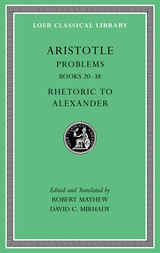
Peripatetic potpourri.
Aristotle of Stagirus (384–322 BC), the great Greek philosopher, researcher, logician, and scholar, studied with Plato at Athens and taught in the Academy (367–347). Subsequently he spent three years in Asia Minor at the court of his former pupil Hermeias, where he married Pythias, one of Hermeias’ relations. After some time at Mitylene, he was appointed in 343/2 by King Philip of Macedon to be tutor of his teen-aged son Alexander. After Philip’s death in 336, Aristotle became head of his own school (of “Peripatetics”), the Lyceum at Athens. Because of anti-Macedonian feeling there after Alexander’s death in 323, he withdrew to Chalcis in Euboea, where he died the following year.
Problems, the third-longest work in the Aristotelian corpus, contains thirty-eight books covering more than 900 problems about living things, meteorology, ethical and intellectual virtues, parts of the human body, and other topics. Although Problems is an accretion of multiple authorship over several centuries, it offers a fascinating technical view of Peripatetic method and thought. Both Problems, in two volumes, and Rhetoric to Alexander replace the earlier Loeb edition by Hett and Rackham, with texts and translations incorporating the latest scholarship.

Aristotle, great Greek philosopher, researcher, reasoner, and writer, born at Stagirus in 384 BCE, was the son of Nicomachus, a physician, and Phaestis. He studied under Plato at Athens and taught there (367–47); subsequently he spent three years at the court of a former pupil, Hermeias, in Asia Minor and at this time married Pythias, one of Hermeias’s relations. After some time at Mitylene, in 343–2 he was appointed by King Philip of Macedon to be tutor of his teen-aged son Alexander. After Philip’s death in 336, Aristotle became head of his own school (of “Peripatetics”), the Lyceum at Athens. Because of anti-Macedonian feeling there after Alexander’s death in 323, he withdrew to Chalcis in Euboea, where he died in 322.Nearly all the works Aristotle prepared for publication are lost; the priceless ones extant are lecture-materials, notes, and memoranda (some are spurious). They can be categorized as follows:I. Practical: Nicomachean Ethics; Great Ethics (Magna Moralia); Eudemian Ethics; Politics; Oeconomica (on the good of the family); Virtues and Vices.
II. Logical: Categories; On Interpretation; Analytics (Prior and Posterior); On Sophistical Refutations; Topica.
III. Physical: Twenty-six works (some suspect) including astronomy, generation and destruction, the senses, memory, sleep, dreams, life, facts about animals, etc.
IV. Metaphysics: on being as being.
V. On Art: Art of Rhetoric and Poetics.
VI. Other works including the Athenian Constitution; more works also of doubtful authorship.
VII. Fragments of various works such as dialogues on philosophy and literature; and of treatises on rhetoric, politics and metaphysics.The Loeb Classical Library® edition of Aristotle is in twenty-three volumes.

Let the reader beware. Educated readers naturally feel entitled to know what they're reading--often, if they try hard enough, to know it with the conspiratorial intimacy of a potential partner. This book reminds us that cultural differences may in fact make us targets of a text, not its co-conspirators. Some literature, especially culturally particular or "minority" literature, actually uses its differences and distances to redirect our desire for intimacy toward more cautious, respectful engagements. To name these figures of cultural discontinuity--to describe a rhetoric of particularism in the Americas--is the purpose of Proceed with Caution.
In a series of daring forays, from seventeenth-century Inca Garcilaso de la Vega to Julio Cortázar and Mario Vargas Llosa, Doris Sommer shows how ethnically marked texts use enticing and frustrating language games to keep readers engaged with difference: Gloria Estefan's syncopated appeal to solidarity plays on Whitman's undifferentiated ideal; unrequitable seductions echo through Rigoberta Menchú's protestations of secrecy, Toni Morrison's interrupted confession, the rebuffs in a Mexican testimonial novel. In these and other examples, Sommer trains us to notice the signs that affirm a respectful distance as a condition of political fairness and aesthetic effect--warnings that will be audible (and engaging for readings that tolerate difference) once we listen for a rhetoric of particularism.

The Harvard Celtic Colloquium was established in 1980 by two graduate students in the Harvard University Department of Celtic Languages and Literatures as a forum in which graduate students could share their work and gain experience in professional academia. Since then, it has been organized annually by a team of students in the department, grown in size, and gained an international reputation which annually draws a diverse mix of scholars from around the world to present papers on all facets of Celtic Studies.
The Harvard Celtic Colloquium is the only conference in the field of Celtic Studies to be wholly organized and run by graduate students. Since its inception, established and internationally-renowned scholars in Celtic as well as graduate students, junior academics, and unaffiliated scholars have been drawn to this dynamic setting, presenting papers on ancient, medieval, and modern topics in the many disciplines relating to Celtic Studies; including literature, linguistics, art, archeology, government, economics, music, and history.
Papers given at the Colloquium may be submitted for review to the organizers of the conference, who become the editors for those papers selected for publication in the Proceedings of the Harvard Celtic Colloquium. Only papers presented at the annual conference are considered for publication.
Harvard University Press is proud to announce that we will distribute the Proceedings of the Harvard Celtic Colloquium. Two new issues are available this Fall: Volume 18/19 (1998 and 1999) and Volume 20/21 (2000 and 2001). Back issues are also available.

Proceedings of the Harvard Celtic Colloquium, 20 includes “Retoiric and Composition in Geneamuin Chormaic,” by Hugh Fogarty; “Classical Ethnography and Celts: Can We Trust the Sources?” by Philip Freeman; “Prayers, Prizefights and Prostitution: The Medieval Irish Cemetery and Its Many Uses,” by Susan Leigh Fry; “Magical Realism and the Mabinogi: An Exercise in Methodology,” by Michael Linkletter; “Rebuke and Revision in the Early Irish Annals: The Death-Notices of Muirchertach mac Ercae [†534],” by Laurence Maney; “‘To a man for the King’: The Allegiance of Welsh Catholics during the First Civil War, 1642–46,” by Robert Matthews; “King and Druid,” by Arun Micheelsen; “‘Words, words, words’: Language about Language in France and Ireland,” by Grace Neville; “Ystoria Tri Brenin o Gwlen,” by Prydwyn Piper; and “Highland Motives in the Jacobite Rising of 1745–46: ‘Forcing Out,’ Traditional Documentation and Gaelic Poetry,” by James A. Stewart, Jr.
Proceedings of the Harvard Celtic Colloquium, 21 includes “Gendering the Vita Prima: An Examination of St. Brigid’s Role as ‘Mary of the Gael,’” by Diane Peters Auslander; “Apollonius of Rhodes’ Argonautica: A Mythology of Greek Expansion in Celtic Lands,” by Timothy P. Bridgman; “The Wealth of the Medieval Welsh Gentry: The Case of Gwilym ap Gruffydd of Penrhyn,” by A. D. Carr; “Celtic Languages in the 1910 U.S. Census,” by Jonathan Dembling; “Digging Deeper: Adventures in Medieval Irish Burial and the Case for Interdisciplinary Scholarship,” by Susan Leigh Fry; “Laoiseach Mac an Bhaird and the Politics of Close Reading,” by Sarah E. McKibben; “Prescient Birds and Prospective Kings: Further Comments on Irish Elements in the Eddic Poem Rígsþula,” by Amy Eichhorn Mulligan; “The Descent of the Gods: Creation, Cosmogony, and Divine Order in Lebor Gabála,” by Sharon Paice Macleod; “Babel Is Come Again: Linguistic Colonisation and the Bardic Response in Early Modern Ireland,” by Patricia Palmer; “‘In Defiance of the Gospel and by Authority of the Devil’: Criticism of Welsh Marriage Law by the English Ecclesiastical Establishment and Its Socio-Political Context,” by Laura Radiker; and “The Way We Were: Twentieth Century Brittany through the Eyes of Breton Language Memorialists,” by Lenora Timm.



Proceedings of the Harvard Celtic Colloquium, 24 includes “The Celticity of Galicia and the Arrival of the Insular Celts,” by Manuel Alberro; “Reading Aislinge Óenguso as a Christian-Platonist Parable,” by Brenda Gray; “Celtic Legends in Irish Opera, 1900–1930,” by Axel Klein; “‘I wonder what the king is doing tonight’—Looking for Arthur in All the Wrong Places,” by Laurance J. Maney†; “What Future for the Irish Gaeltacht Communities in the Twenty-First Century?” by Nollaig Ó Gadhra†; “Acallam Na Senórach as Prosimetrum,” by Geraldine Parsons; “Traditional and Courtly Themes in a Medieval Welsh Elegy to a ‘Góann Wargann Wery’ (‘A Fair Virgin, Meek and Mild’),” by Laura Radiker; and “Welsh Prophetic Poetry in the Age of the Princes,” by Elizabeth Schoales.
Proceedings of the Harvard Celtic Colloquium, 25 includes “Keltoi, Galatai, Galli: Were They All One People?” by Timothy P. Bridgman; “On Verbal Nouns in Celtic Languages,” by Chao Li; “Cross-Linguistic Discourse Markers in Manx Gaelic and English,” by Marie Clague; “The Acallam na Senórach: A Medieval Instruction Manual,” by Annie Donahue; “Gendered Postcolonial Discourse in the Mabinogi,” by Morgan Kay; “Language Death and Resurrection in the Isle of Man: The Continuity of Manx Gaelic Exemplified by the Use of Inflected Verb Tenses,” by Jennifer Kewley Draskau; “High Kings and Pipe Dreams: Revisiting John Vincent Kelleher’s Theory of Revision to the Early Irish Annals,” by Laurance J. Maney†; and “The Rise of Christian Nomenclature in Medieval Scotland,” by David Morris.

Proceedings of the Harvard Celtic Colloquium, 26 includes “Heroic Recycling in Celtic Tradition,” by Joseph F. Nagy; “On the Celtic-American Fringe: Irish–Mexican Encounters in the Texas–Mexico Borderlands,” by Marian J. Barber; “The Encomium Urbis in Medieval Welsh Poetry,” by Helen Fulton; “Prophecy in Welsh Manuscripts,” by Morgan Kay; “‘Ceol agus Gaol’ (‘Music and Relationship’): Memory, Identity, and Community in Boston’s Irish Music Scene,” by Natalie Kirschstein; “Colonization Circulars: Timber Cycles in the Time of Famine,” by Kathryn Miles; “Up Close and Personal: The French in Bantry Bay (1796) in the Bantry Estate Papers,” by Grace Neville; “In Praise of Two Margarets: Two Laudatory Poems by Piaras Feiritéar,” by Deirdre Nic Mhathúna; “Observations on Cross-Cultural Names and Name Patterns in Medieval Wales and the March,” by Laura Radiker; and “Mouth to Mouth: Gaelic Stories as Told within One Family,” by Carol Zall.
Proceedings of the Harvard Celtic Colloquium, 27 includes “Poets and Carpenters: Creating the Architecture of Happiness in Late-Medieval Wales,” by Richard Suggett; “Revisiting Preaspiration: Evidence from the Survey of the Gaelic Dialects of Scotland,” by Anna Bosch; “The Anoetheu Dialogue in Culhwch ac Olwen,” by Fiona Dehghani; “Homophony and Breton Loss of Lexis,” by Francis Favereau; “The Origins of ‘the Jailtacht,’” by Diarmait Mac Giolla Chríost; “A Confluence of Wisdom: The Symbolism of Wells, Whirlpools, Waterfalls and Rivers in Early Celtic Sources,” by Sharon Paice MacLeod; “The Real Charlotte: The Exclusive Myth of Somerville and Ross,” by Donald McNamara; “Language Shift in Early Twentieth-Century Ireland,” by Máire Ní Chiosáin; and “Conceptions of an Urban Ideal and the Early Modern Welsh Town,” by Sally-Anne Shearn.



Proceedings of the Harvard Celtic Colloquium has in its purview all aspects of culture, language, and history of the Celtic peoples, from ancient to modern times.
This volume of PHCC contains articles on medieval Irish, Welsh, and Breton literature; post-1800 to modern poetry in Irish, Welsh, and Scottish Gaelic; the Irish Revival Movement; and modern Irish and Welsh linguistics. The volume also features the 2010 J. V. Kelleher Lecture by Dr. M. Katharine Simms on the social expression of the literary model of the barefoot king in late medieval Ireland.



The Harvard Celtic Colloquium provides a small but international audience for presentations by scholars from all ranks of scholarship and all areas of Celtic Studies. Among the topics covered are the archaeology, history, culture, linguistics, literatures, politics, religion, and social structures of the countries and regions in which Celtic languages are, or were, spoken, as well as their extended influence, from prehistory to the present. The broad range of the conference is reflected in the content of its published proceedings, which will interest both students newly attracted to Celtic Studies and senior scholars in the field.
PHCC, 33 features the annual John V. Kelleher Lecture for 2013, given by Thomas Owen Clancy, Professor of Celtic at the University of Glasgow, Scotland. Clancy discusses connections between Scottish saints’ names and cults and the onomastics of settlements and topographical features gathered and investigated in preparation for a digital atlas project, “Commemoration of Saints in Scottish Place Names.” In addition, PHCC, 33 includes contributions in the areas of Irish, Welsh, and Scottish history, Irish and Welsh literature and poetry, and Irish ecclesiastical learning.

The Harvard Celtic Colloquium provides a small but international audience for presentations by scholars from all ranks of scholarship and all areas of Celtic Studies. Among the topics covered are the archaeology, history, culture, linguistics, literatures, politics, religion, and social structures of the countries and regions in which Celtic languages are, or were, spoken, and their extended influence, from prehistory to the present. The broad range of the conference is reflected in the content of its published proceedings, which will interest students newly attracted to Celtic Studies as well as senior scholars in the field.
PHCC 34 includes the John V. Kelleher Lecture for 2014 given by Ann Parry Owen, “‘An audacious man of beautiful words’: Ieuan Gethin (c.1390–c.1470).” Several papers in this volume deal with the reflection of political forces and contemporary leaders in the early modern period in the literature of Ireland and Wales. Others consider the influence of Christian authors on Ireland as reflected in various surviving literary documents and tales. Of particular interest for the history of Celtic Studies are articles on early scholarship in the field, and Irish and Welsh vernacular authors who incorporated medieval literary motifs into their own work.

The Harvard Celtic Colloquium provides a small but international audience for presentations by scholars from all ranks of scholarship and all areas of Celtic Studies, the archaeology, history, culture, linguistics, literatures, politics, religion, and social structures of the countries and regions in which Celtic languages are or were spoken, and their extended influence, from prehistory to the present. The broad range of the conference is reflected in the content of its published proceedings, which will interest students newly attracted to Celtic Studies as well as senior scholars in the field.
PHCC, 35 includes the 2015 John V. Kelleher Lecture, “Whodunnit? Indirect Evidence in Early Irish Law,” given by Dr. Fergus Kelly of the School of Celtic Studies, Dublin Institute for Advanced Studies, Dublin, Ireland. Kelly is highly regarded for his command of the large and complex body of Irish legal literature and its social context. Other papers in this volume concern the social context and manuscript tradition of early Irish law; medieval Welsh and Irish literary, poetical, and hagiographical material; modern uses of medieval themes; modern Celtic languages, Irish, Welsh and Breton; and the considerations of using digital resources for Celtic Studies.


This volume of the Proceedings of the Harvard Celtic Colloquium offers a wide range of articles on topics across the field of Celtic Studies.
It includes the 2017 J. V. Kelleher lecture delivered by Paul Russell, Professor of Celtic, University of Cambridge, entitled “‘Mistakes of All Kinds’: The Glossography of Medieval Irish Literary Texts.” In this address Russell offers cogent analysis of this rarely addressed facet of medieval Irish codicology. The articles from other presentations at the Colloquium extend the focus on Celtic glossing into other areas of Celtic linguistics and literary studies. In addition, the volume includes articles on the medieval folkloric, religious, legal, and material culture of Celtic communities, some aspects of which persist into modernity. This volume exemplifies the broad range of topics and time periods characteristic of the Harvard Celtic Colloquium.

Proceedings of the Harvard Celtic Colloquium, 38 collects papers ranging widely on topics of the literary and material culture of the Celtic regions of Ireland, Wales, and Breton in the medieval and modern periods. Several articles concern the self-awareness of the literary elite in Ireland and Wales, whose members respected the traditional forms of their literature but used them to further contemporary purposes. For example, they introduce new references to foreign places and cultures, or use older topographical lore to describe and justify contemporary land use and settlement. Other articles review material culture as it is reflected in literary works of their respective periods and discuss how this in turn illuminates the attitudes of the authors and their intended readers. A number of contributions concern the grammatical structure and linguistic formation of the languages of Ireland, Wales, and Brittany, both early and modern.
The special lecture for the Harvard Celtic Colloquium this year was given by Dr. Aled Jones, Senior Lecturer in Welsh and Medieval Studies at Bangor University, Wales, comparing modern astrophysics to the plasticity of time in medieval Celtic literature, a thought-provoking consideration of congruences in modern and medieval conceptions of time and space. This volume also contains the 2018 Kelleher lecture given by Dr. William Gilles of the University of Edinburgh on a problematic early Scots-Gaelic text, the Harlaw Brosnachadh.

This volume of the Proceedings of the Harvard Celtic Colloquium offers a wide range of articles on topics across the field of Celtic Studies. It includes the Colloquium keynote given by Prof. Barbara Hillers which studied the literary use of folklore, Irish and international, in the Irish tale “Aislinge Meic Con Glinne” (“The Vision of Mac Con Glinne”).
More recent literary topics expand the scope of this volume from the medieval into the early modern period, and into the early twentieth century. Of special interest to scholars of more recent times will be articles on the Irish language in nineteenth-century American print media, and on the unpublished sequel by Muiris Ó Súilleabháin to his memoir Fiche Blian ag Fás (1933), which was published in English as Twenty Years a-Growing.

This volume of Proceedings of the Harvard Celtic Colloquium is graced with two J. V. Kelleher lectures: the 2019 lecture by Máire Ní Mhaonaigh on Irish chronicles and the 2021 presentation by Ruairí Ó hUiginn assessing the Irish genealogical corpus in its sociological context. It also includes Georgia Henley’s 2021 keynote on the differing literary receptions in Norman Ireland and Wales of Geoffrey of Monmouth’s history of Britain and related prophecies.
Other articles in Volume 40 survey a wide array of topics in Celtic Studies, centering on Irish and Welsh material with the smaller language areas appearing as well, and ranging from medieval to modern times. While most are literary or linguistic in their focus, some historical context is also provided.

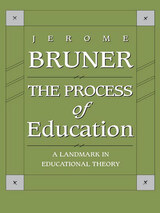
In this classic argument for curriculum reform in early education, Jerome Bruner shows that the basic concepts of science and the humanities can be grasped intuitively at a very early age. He argues persuasively that curricula should he designed to foster such early intuitions and then build on them in increasingly formal and abstract ways as education progresses.
Bruner’s foundational case for the spiral curriculum has influenced a generation of educators and will continue to be a source of insight into the goals and methods of the educational process.

Most neurology is done by general physicians rather than by neurologists. Still, neurology is perceived by doctors to be one of the most troublesome and difficult medical specialties. Neurologic symptoms are often vague and uncertain, and seemingly insignificant symptoms can reflect frightening disorders.
Thomas Glick, a superb teacher as well as an experienced clinician, has written this book in the belief that errors in handling neurologic cases stem not so much from a failure to command a daunting body of knowledge as from inadequate clinical reasoning. Dr. Glick shows how the skills of the primary-care physician can be applied to the special problems of neurologic history-taking and physical examination. He emphasizes time-saving ways to focus the exam and avoid diagnostic error. The book describes clear procedures for cases that the generalist can handle comfortably and offers guidelines on when (and how) to seek the advice of the consultant neurologist. Case histories, scattered liberally throughout the text, highlight the discussions and give the reader a rich sampling of specific methods of problem solving.
Clinicians who feel skeptical about the effectiveness of neurologic therapy or frustrated by its application will find here a commonsense approach to therapeutic planning. Chapters on ambulatory and chronic neurologic care also convey a positive sense of the broader therapeutic possibilities that exist in neurologic practice. Neurologic residents, senior medical students, psychiatrists, and allied health professionals, as well as primary caregivers, will benefit from the insights contained in this sensitive and articulate book.

In 1952 Bolivia was transformed by revolution. With the army destroyed from only a few days of fighting, workers and peasants took up arms to claim the country as their own. Overnight, the electorate expanded five-fold. Industries were turned over to worker organizations to manage, and land was distributed to peasant communities. Education became universal and free for the first time in the country's history.
This volume, the result of a conference organized by the David Rockefeller Center for Latin American Studies of Harvard University and the Institute for Latin American Studies at the University of London, presents new interpretations of the causes of the events of 1952 and compares them to the great social transformations that occurred in France, Mexico, Russia, China, and Cuba. It also considers the consequences of the revolution by examining the political, social, and economic development of the country, as well as adding important insights to the analysis of revolution and the understanding of this fascinating Andean country.

The question of the comparative efficiency of socialism, long debated in theoretical discussions, is explored in depth in these studies. Abram Bergson, one of the foremost Western scholars of the Soviet system, focuses especially on socialism as found in the USSR, and thus on the famous “Soviet model.” This includes centralist planning with its reliance on bureaucratic, as distinct from market processes, and a development strategy stressing growth and, until recently, limited economic relations with the capitalist West. Devoting some attention also to the experience with the “Soviet model” in Eastern Europe, Bergson compares the resulting economic performance with that in the West. The United States is the major Western country considered, but Western European nations are also studied with care and precision.
The “Soviet model” has been evolving in the course of time, and these studies explore recent developments in planning, particularly managerial incentives and controls, and growth strategy. In contrasting Eastern and Western economic performance, Bergson uses sophisticated quantitative techniques to contrast levels and growth of productivity while allowing for differences in historical factors, especially the stage of economic development. Productivity is considered both for the economy generally and for its sectors. Although socialist efficiency is investigated mainly through the Soviet case, this path-breaking book should serve as a point of departure for further inquiries into that large theme.



The discipline of literary criticism is strictly defined, and the most pressing issues of our time—racism, violence against women and homosexuals, cultural imperialism, and the like—are located outside its domain. In Professional Correctness, Stanley Fish raises a provocative challenge to those who try to turn literary studies into an instrument of political change, arguing that when literary critics try to influence society at large by addressing social and political issues, they cease to be literary critics at all.
Anyone interested in the debate over the place of cultural studies in the field of literary criticism, or the more general question of whether academics can become the "public intellectuals" many aspire to be, needs to read Fish's powerful and unconventional argument for restoring discipline to the academy.

In this concise analysis, written with elegant wit, the greatest living textual critic of Latin authors offers new insight into the poetry of Horace.
Horace is best known for his four books of Odes, cherished for their lyric grace. His amiable persona is displayed more intimately in the moralizing verses of the Satires and Epistles. In a reading of all the poetry, but focusing especially on problematic areas, Shackleton Bailey examines Horace's art of self-presentation. A variety of themes are elucidated, from the poet's relations with his patron to Roman sexual attitudes. Close scrutiny is given to about thirty passages which, he argues, have been misread. An appended essay on a notable predecessor, the textual scholar Richard Bentley, is especially revealing on the art of classical scholarship.

After the age of 40, we may notice occasional lapses—a forgotten phone number, a friend's name, or a word that was right on the tip of our tongue. By 60, we may find ourselves wondering who called this morning, why we came into the kitchen, where we parked the car. In an aging nation, where one citizen in seven will be 65 when the next century arrives, these little difficulties raise a larger question: What precisely happens to our thinking as we grow older? What is normal, what is not, and how are we to know the signs?
Douglas Powell offers a comprehensive account of cognitive aging, of how our mental functions change as we mature. Defining patterns of normal decline, as well as severe forms of cognitive impairment, this book will help us understand and address the needs of an aging population. Powell integrates the latest literature on aging with the findings of his recent study of 1,000 physicians and 600 other subjects ranging in age from 25 to 92. His work reveals patterns of cognitive aging throughout the life cycle, particularly the way in which variability among individuals outpaces the decline of overall ability. Tackling an issue of growing interest in the field of gerontology, he notes the effect of certain factors such as gender, diet, health, and physical and mental exercise on changes in cognitive functioning over time.
Along with the criteria for mild cognitive impairment and normal cognitive aging, this book addresses the question of optimal cognitive aging, identifying its characteristics and searching out their implications for the maintenance of intellectual abilities in the post-retirement years.
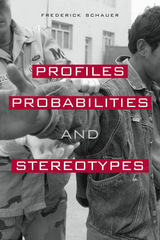
This book employs a careful, rigorous, yet lively approach to the timely question of whether we can justly generalize about members of a group on the basis of statistical tendencies of that group. For instance, should a military academy exclude women because, on average, women are more sensitive to hazing than men? Should airlines force all pilots to retire at age sixty, even though most pilots at that age have excellent vision? Can all pit bulls be banned because of the aggressive characteristics of the breed? And, most controversially, should government and law enforcement use racial and ethnic profiling as a tool to fight crime and terrorism?
Frederick Schauer strives to analyze and resolve these prickly questions. When the law “thinks like an actuary”—makes decisions about groups based on averages—the public benefit can be enormous. On the other hand, profiling and stereotyping may lead to injustice. And many stereotypes are self-fulfilling, while others are simply spurious. How, then, can we decide which stereotypes are accurate, which are distortions, which can be applied fairly, and which will result in unfair stigmatization?
These decisions must rely not only on statistical and empirical accuracy, but also on morality. Even statistically sound generalizations may sometimes have to yield to the demands of justice. But broad judgments are not always or even usually immoral, and we should not always dismiss them because of an instinctive aversion to stereotypes. As Schauer argues, there is good profiling and bad profiling. If we can effectively determine which is which, we stand to gain, not lose, a measure of justice.


Hippocrates, said to have been born in Cos in or before 460 BCE, learned medicine and philosophy; travelled widely as a medical doctor and teacher; was consulted by King Perdiccas of Macedon and Artaxerxes of Persia; and died perhaps at Larissa. Apparently he rejected superstition in favour of inductive reasoning and the study of real medicine as subject to natural laws, in general and in individual people as patients for treatment by medicines and surgery. Of the roughly 70 works in the 'Hippocratic Collection' many are not by Hippocrates; even the famous oath may not be his. But he was undeniably the 'Father of Medicine'.
The works available in the Loeb Classical Library edition of Hippocrates are the following. Volume I: Ancient Medicine. Airs, Waters, Places. Epidemics 1 and 3. The Oath. Precepts. Nutriment. Volume II: Prognostic. Regimen in Acute Diseases. The Sacred Disease. The Art. Breaths. Law. Decorum. Physician (Ch. 1). Dentition. Volume III: On Wounds in the Head. In the Surgery. On Fractures. On Joints. Mochlicon. Volume IV: Nature of Man. Regimen in Health. Humours. Aphorisms. Regimen 13. Dreams. Volume V: Affections. Diseases 12. Volume VI: Diseases 3. Internal Affections. Regimen in Acute Diseases. Volume VII: Epidemics 2 and 47. Volume VIII: Places in Man. Glands. Fleshes. Prorrhetic III. Physician. Use of Liquids. Ulcers. Haemorrhoids and Fistulas. Volume IV also contains the fragments of Heracleitus, On the Universe.

As the federal government’s programs have increased in complexity, with regard both to world and national affairs and to state and local interests, the problems of decision making have become vastly more intricate. This book is designed to help improve understanding of the principles of program budgeting in relation to the decisionmaking process in the federal government; to stimulate others to develop these ideas further; and to accelerate the application of program budgeting in governmental activities.
Divided into three sections, the book begins with a discussion of the government decisionmaking process, the role of budgeting, and efforts made in past years by the federal government to improve the planning–programming–budgeting process. The second section covers the introduction of program budgeting in the Department of Defense and possible application to other federal activities. The third section deals with the subject of implementation and operation of the program budget and discusses an operating federal program budget in terms of its usefulness to specific areas.
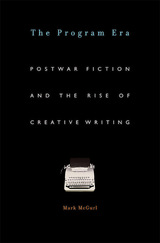
In The Program Era, Mark McGurl offers a fundamental reinterpretation of postwar American fiction, asserting that it can be properly understood only in relation to the rise of mass higher education and the creative writing program. McGurl asks both how the patronage of the university has reorganized American literature and—even more important—how the increasing intimacy of writing and schooling can be brought to bear on a reading of this literature.
McGurl argues that far from occasioning a decline in the quality or interest of American writing, the rise of the creative writing program has instead generated a complex and evolving constellation of aesthetic problems that have been explored with energy and at times brilliance by authors ranging from Flannery O’Connor to Vladimir Nabokov, Philip Roth, Raymond Carver, Joyce Carol Oates, and Toni Morrison.
Through transformative readings of these and many other writers, The Program Era becomes a meditation on systematic creativity—an idea that until recently would have seemed a contradiction in terms, but which in our time has become central to cultural production both within and beyond the university.
An engaging and stylishly written examination of an era we thought we knew, The Program Era will be at the center of debates about postwar literature and culture for years to come.

Faith in progress is a characteristic we often associate with the Victorian era. Victorian intellectuals and free-thinkers who believed in progress and wrote history from a progressive point of view—men such as Leslie Stephen, John Morley, W. E. H. Lecky, and James Anthony Froude—are usually thought to have done so because they were optimistic about their own times. Their optimism has been seen as the result of a successful Liberal campaign for political reform in the sixties and seventies, carried out in alliance with religious dissenters—a campaign that removed religion from the arena of public debate.
Jeffrey Paul von Arx challenges this long-standing view of the Victorian intellectual aristocracy. He sees them as preoccupied with and even fearful of a religious resurgence throughout their careers, and demonstrates that their loss of confidence in contemporary liberalism began with their disillusionment over the effects of the Franchise Reform Act of 1867. He portrays their championing of the idea of progress as motivated not by optimism about the present, but by their desire to explain away and reverse if possible contemporary religious and political trends, such as the new mass politics in England and Ireland.
This is the first book to explore how pessimism could be the psychological basis for the Victorians’ progressive conception of history. Throughout, von Arx skillfully interweaves threads of religion, politics, and history, showing how ideas in one sphere cannot be understood without reference to the others.
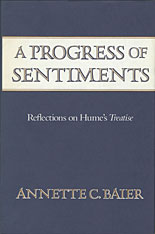
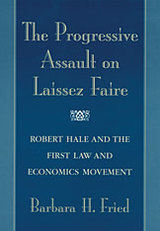
Law and economics is the leading intellectual movement in law today. This book examines the first great law and economics movement in the early part of the twentieth century through the work of one of its most original thinkers, Robert Hale. Beginning in the 1890s and continuing through the 1930s, progressive academics in law and economics mounted parallel assaults on free-market economic principles. They showed first that "private," unregulated economic relations were in fact determined by a state-imposed regime of property and contract rights. Second, they showed that the particular regime of rights that existed at that time was hard to square with any common-sense notions of social justice.
Today, Hale is best known among contemporary legal academics and philosophers for his groundbreaking writings on coercion and consent in market relations. The bulk of his writing, however, consisted of a critique of natural property rights. Taken together, these writings on coercion and property rights offer one of the most profound and elaborated critiques of libertarianism, far outshining the better-known efforts of Richard Ely and John R. Commons. In his writings on public utility regulation, Hale also made important contributions to a theory of just, market-based distribution.
This first, full-length study of Hale's work should be of interest to legal, economic, and intellectual historians.
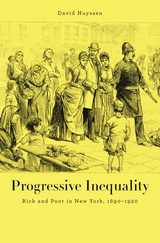
The Progressive Era has been depicted as a seismic event in American history—a landslide of reform that curbed capitalist excesses and reduced the gulf between rich and poor. Progressive Inequality cuts against the grain of this popular consensus, demonstrating how income inequality’s growth prior to the stock market crash of 1929 continued to aggravate class divisions. As David Huyssen makes clear, Progressive attempts to alleviate economic injustice often had the effect of entrenching class animosity, making it more, not less, acute.
Huyssen interweaves dramatic stories of wealthy and poor New Yorkers at the turn of the twentieth century, uncovering how initiatives in charity, labor struggles, and housing reform chafed against social, economic, and cultural differences. These cross-class actions took three main forms: prescription, in which the rich attempted to dictate the behavior of the poor; cooperation, in which mutual interest engendered good-faith collaboration; and conflict, in which sharply diverging interests produced escalating class violence. In cases where reform backfired, it reinforced a set of class biases that remain prevalent in America today, especially the notion that wealth derives from individual merit and poverty from lack of initiative.
A major contribution to the history of American capitalism, Progressive Inequality makes tangible the abstract dynamics of class relations by recovering the lived encounters between rich and poor—as allies, adversaries, or subjects to inculcate—and opens a rare window onto economic and social debates in our own time.

How to lead the people and be one of them? What's a democratic intellectual to do? This longstanding dilemma for the progressive intellectual, how to bridge the world of educated opinion and that of the working masses, is the focus of Leon Fink's penetrating book, the first social history of the progressive thinker caught in the middle of American political culture.
In a series of vivid portraits, Fink investigates the means and methods of intellectual activists in the first part of the twentieth century--how they served, observed, and made their own history. In the stories of, among others, John R. Commons, Charles McCarthy, William English Walling, Anna Strunsky Walling, A. Philip Randolph, W. Jett Lauck, and Wil Lou Gray, he creates a panorama of reform of unusual power. Issues as broad as the cult of leadership and as specific as the Wisconsin school of labor history lead us into the heart of the dilemma of the progressive intellectual in our age.
The problem, as Fink describes it, is twofold: Could people prevail in a land of burgeoning capitalism and concentrated power? And should the people prevail? This book shows us Socialists and Progressives and, later, New Dealers grappling with these questions as they tried to redress the new inequities of their day--and as they confronted the immense frustrations of moving the masses. Fink's graphic depiction of intellectuals' labors in the face of capitalist democracy's challenges dramatizes a time in our past--and at the same time speaks eloquently to our own.
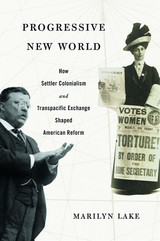
The paradox of progressivism continues to fascinate more than one hundred years on. Democratic but elitist, emancipatory but coercive, advanced and assimilationist, Progressivism was defined by its contradictions. In a bold new argument, Marilyn Lake points to the significance of turn-of-the-twentieth-century exchanges between American and Australasian reformers who shared racial sensibilities, along with a commitment to forging an ideal social order. Progressive New World demonstrates that race and reform were mutually supportive as Progressivism became the political logic of settler colonialism.
White settlers in the United States, who saw themselves as path-breakers and pioneers, were inspired by the state experiments of Australia and New Zealand that helped shape their commitment to an active state, women’s and workers’ rights, mothers’ pensions, and child welfare. Both settler societies defined themselves as New World, against Old World feudal and aristocratic societies and Indigenous peoples deemed backward and primitive.
In conversations, conferences, correspondence, and collaboration, transpacific networks were animated by a sense of racial kinship and investment in social justice. While “Asiatics” and “Blacks” would be excluded, segregated, or deported, Indians and Aborigines would be assimilated or absorbed. The political mobilizations of Indigenous progressives—in the Society of American Indians and the Australian Aborigines’ Progressive Association—testified to the power of Progressive thought but also to its repressive underpinnings. Burdened by the legacies of dispossession and displacement, Indigenous reformers sought recognition and redress in differently imagined new worlds and thus redefined the meaning of Progressivism itself.
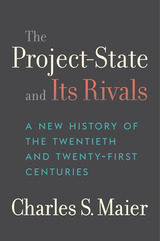
A new and original history of the forces that shaped the twentieth and twenty-first centuries.
We thought we knew the story of the twentieth century. For many in the West, after the two world conflicts and the long cold war, the verdict was clear: democratic values had prevailed over dictatorship. But if the twentieth century meant the triumph of liberalism, as many intellectuals proclaimed, why have the era’s darker impulses—ethnic nationalism, racist violence, and populist authoritarianism—revived?
The Project-State and Its Rivals offers a radical alternative interpretation that takes us from the transforming challenges of the world wars to our own time. Instead of the traditional narrative of domestic politics and international relations, Charles S. Maier looks to the political and economic impulses that propelled societies through a century when territorial states and transnational forces both claimed power, engaging sometimes as rivals and sometimes as allies. Maier focuses on recurring institutional constellations: project-states including both democracies and dictatorships that sought not just to retain power but to transform their societies; new forms of imperial domination; global networks of finance; and the international associations, foundations, and NGOs that tried to shape public life through allegedly apolitical appeals to science and ethics.
In this account, which draws on the author’s studies over half a century, Maier invites a rethinking of the long twentieth century. His history of state entanglements with capital, the decline of public projects, and the fragility of governance explains the fraying of our own civic culture—but also allows hope for its recovery.

Socialist doctrines had an important influence on Korean writers and intellectuals of the early twentieth century. From the 1910s through the 1940s, a veritable wave of anarchist, Marxist, nationalist, and feminist leftist groups swept the cultural scene with differing agendas as well as shared demands for equality and social justice. In The Proletarian Wave, Sunyoung Park reconstructs the complex mosaic of colonial leftist culture by focusing on literature as its most fertile and enduring expression. The book combines a general overview of the literary left with the intellectual portraits of four writers whose works exemplify the stylistic range and colonial inflection of socialist culture in a rapidly modernizing Korea. Bridging Marxist theory and postcolonial studies, Park confronts Western preconceptions about third-world socialist cultures while interrogating modern cultural history from a post–Cold War global perspective.
The Proletarian Wave provides the first historical account in English of the complex interrelations of literature and socialist ideology in colonial Korea. It details the origins, development, and influence of a movement that has shaped twentieth-century Korean politics and aesthetics alike through an analysis that simultaneously engages some of the most debated and pressing issues of literary historiography, Marxist criticism, and postcolonial cultural studies.

Hunan province has long interested students of modern China. A citadel of orthodoxy in the nineteenth century and a mainspring of revolution in the twentieth, it is an ideal focus for a study of the great transformation that occurred during the last two decades of the Ch'ing dynasty.
Hunan's experience illuminates key questions. How did foreign imperialism affect Chinese society? What ties bound the provinces to the central government, and how were these ties loosened to permit the secession movement of 1911? Why did nationalism emerge so abruptly and strongly after 1895? How did it differ from the antiforeignism that preceded it, and what did it contribute to the movement against the dynasty? As nationalism became strong, why did social revolution remain weak?
Since Hunanese leadership, moving from orthodoxy through revolution, constitutes one of the great continuities in China's modern history, the answers that a study of Hunan gives to these questions are relevant to larger patterns of change in China as a whole. Charlton Lewis has written a valuable handbook of national as well as provincial events during the turbulent period around the turn of the century.


Males are promiscuous and ferociously competitive. Females--both human and of other species--are naturally monogamous. That at least is what the study of sexual behavior after Darwin assumed, perhaps because it was written by men. Only in recent years has this version of events been challenged. Females, it has become clear, are remarkably promiscuous and have evolved an astonishing array of strategies, employed both before and after copulation, to determine exactly who will father their offspring.
Tim Birkhead reveals a wonderful world in which males and females vie with each other as they strive to maximize their reproductive success. Both sexes have evolved staggeringly sophisticated ways to get what they want--often at the expense of the other. He introduces us to fish whose first encounter locks them together for life in a perpetual sexual embrace; hermaphrodites who "joust" with their reproductive organs, each trying to inseminate the other without being inseminated; and tiny flies whose seminal fluid is so toxic that it not only destroys the sperm of rival males but eventually kills the female. He explores the long and tortuous road leading to our current state of knowledge, from Aristotle's observations on chickens, to the first successful artificial insemination in the seventeenth century, to today's ingenious molecular markers for assigning paternity. And he shows how much human behavior--from the wife-sharing habits of Inuit hunters to Charlie Chaplin's paternity case--is influenced by sperm competition.
Lucidly written and lavishly illustrated, with a wealth of fascinating detail and vivid examples, Promiscuity is the ultimate guide to the battle of the sexes.
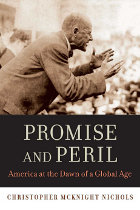
Spreading democracy abroad or taking care of business at home is a tension as current as the war in Afghanistan and as old as America itself. Tracing the history of isolationist and internationalist ideas from the 1890s through the 1930s, Nichols reveals unexpected connections among individuals and groups from across the political spectrum who developed new visions for America’s place in the world.
From Henry Cabot Lodge and William James to W. E. B. Du Bois and Jane Addams to Randolph Bourne, William Borah, and Emily Balch, Nichols shows how reformers, thinkers, and politicians confronted the challenges of modern society—and then grappled with urgent pressures to balance domestic priorities and foreign commitments. Each articulated a distinct strain of thought, and each was part of a sprawling national debate over America’s global role. Through these individuals, Nichols conducts us into the larger community as it strove to reconcile America’s founding ideals and ideas about isolation with the realities of the nation’s burgeoning affluence, rising global commerce, and new opportunities for worldwide cultural exchange. The resulting interrelated set of isolationist and internationalist principles provided the basis not just for many foreign policy arguments of the era but also for the vibrant as well as negative connotations that isolationism still possesses.
Nichols offers a bold way of understanding the isolationist and internationalist impulses that shaped the heated debates of the early twentieth century and that continue to influence thinking about America in the world today.

What is the right social policy for the future? Sar A. Levitan and Robert Taggart have written a book that dispassionately examines recent social programs. They respond to the fashionable arguments that question the results of government intervention and the need to correct social and economic ills. They weigh the charges that new programs have been wasteful, ineffective, and even counterproductive. The authors disprove the notion that recent social programs have failed, that recipients of aid have been hurt more than helped, or that the means and the ends of the last decade’s social policies were misconceived.
They base their conclusions upon data gathered by a host of governmental agencies as well as by other scholarly studies. Among their major findings:
— The expansion of welfare will not continue indefinitely since most of those in need have been reached. In a healthy economy welfare costs will stabilize. In spite of its shortcomings, welfare has resulted in a more equitable, comprehensive system of income protection.
— Medicare and Medicaid have not contributed to a national “health crisis” but have delivered health care to millions who might otherwise have been unable to afford it.
— Housing assistance has been unfairly condemned. While changes are warranted the concepts are sound and the benefits undeniable.
— Federal programs for vocational training, job placement, remedial education, and other services have a high payoff for the individuals involved and for society as a whole.
— Federal efforts have been instrumental in the substantial progress made by minorities.
Levitan and Taggart consistently document effective, positive achievements by government to promote the general welfare and to redress many of the nation’s most serious social and economic ills stemming from poverty, discrimination, and old age. They argue that an affluent and compassionate society has the ability and responsibility to extend rather than to retrench its basic system of protection for those who cannot make it on their own. If progress toward a just society is to continue, the new agenda must begin with a judicious and comprehensive reappraisal of last decade’s reforms. The Promise of Greatness provides such a perspective. Based upon a sound analysis of past legislation, it will certainly be an indispensable guide to the future policies that shape this country.
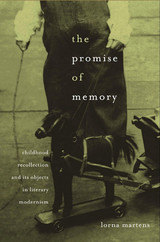
Readers once believed in Proust’s madeleine and in Wordsworth’s recollections of his boyhood—but that was before literary culture began to defer to Freud’s questioning of adult memories of childhood. In this first sustained look at childhood memories as depicted in literature, Lorna Martens reveals how much we may have lost by turning our attention the other way. Her work opens a new perspective on early recollection—how it works, why it is valuable, and how shifts in our understanding are reflected in both scientific and literary writings.
Science plays an important role in The Promise of Memory, which is squarely situated at the intersection of literature and psychology. Psychologists have made important discoveries about when childhood memories most often form, and what form they most often take. These findings resonate throughout the literary works of the three writers who are the focus of Martens’ book. Proust and Rilke, writing in the modernist period before Freudian theory penetrated literary culture, offer original answers to questions such as “Why do writers consider it important to remember childhood? What kinds of things do they remember? What do their memories tell us?” In Walter Benjamin, Martens finds a writer willing to grapple with Freud, and one whose writings on childhood capture that struggle.
For all three authors, places and things figure prominently in the workings of memory. Connections between memory and materiality suggest new ways of understanding not just childhood recollection but also the artistic inclination, which draws on a childlike way of seeing: object-focused, imaginative, and emotionally intense.
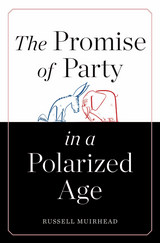
At the root of America’s broken politics is hyperbolic partisanship. It distorts perceptions, inflames disagreements, and poisons the democratic process. Citizens pine for a time when liberals and conservatives compromised with one another—or they yearn for a post-partisan future when the common good trumps ideology and self-interest. Russell Muirhead argues that better partisanship, not less partisanship, is the solution to America’s political predicament. Instead of striving to overcome our differences, we should learn how to engage them.
The political conflicts that provide fodder for cable news shows are not simply manufactured from thin air. However sensationalized they become in the retelling, they originate in authentic disagreements over what constitutes the common welfare. Republicans vest responsibility in each citizen for dealing with bad decisions and bad luck, and want every individual and family to enjoy the benefits of good decisions and good luck. Democrats ask citizens to stand together to insure one another against the worst consequences of misfortune or poor judgment, and especially to insure children against some of the consequences of their parents’ bad decisions or lack of opportunities. These are fundamental differences that fantasies of bipartisan consensus cannot dissolve.
Disagreement without parties is disempowering, Muirhead says. The remedy is not for citizens and elected officials to learn to “just get along” but for them to bring a skeptical sensibility even to their own convictions, and to learn to disagree as partisans and govern through compromise despite those disagreements.

The private pension is a curiosity in the modern economic environment. Why do profit-seeking companies pay retirement benefits to those no longer on the job? In this new institutional history, Steven Sass explores the rise and growth of the financial support system that today commands trillions of dollars of investment capital and supports hundreds of thousands of older Americans.
Before 1900 America's elderly derived their livelihood from simple sources. They worked if they could, relied on their children, and took charity if necessary. By the dawn of the twentieth century, however, the country was constructing a new industrial economy. Both laborers and capital were moving away from farms toward large corporate establishments. These market changes weakened family links and traditional skills, rendering workers more vulnerable to economic shocks. The elderly, in particular, fell out of step with the new mechanized and bureaucratic regime. It was in response to these dramatic economic shifts that the institution of private pensions emerged. In return for workers' long-term loyalty, employers promised to help sustain them through old age.
As Sass shows, creating the pension system proved far more complicated than anyone had anticipated. Over the last hundred years it has evolved into a complex institution driven by congressional mandates, judicial/administrative decisions, union campaigns, political debates, and the ministrations of lawyers, economists, human resource specialists, actuaries, and insurance experts. Sass traces the U.S. pension system through to the present day, exploring how our modern corporate economy is confronting the challenges of an aging population.



This collection of essays examines Zambia’s efforts to promote economic reform during the 1990s. Following the restoration of democratic rule, the government of Zambia adopted an ambitious program designed to stabilize the economy and lay the foundation for sustained growth and development. These essays describe the adjustment program, highlighting the attempts to reform the budget, the tax system, the financial system, agriculture and mining, and to create the human capacity to sustain the reforms.
Major improvements in economic performance occurred from 1992 to 1995. After that, however, economic performance deteriorated as a result of the government’s selective abandonment of key elements of the reform program and the emergence of major governance problems. In response to international pressure, by 2001 the government completed the sale of the copper mines and qualified for large-scale debt relief. The long delays involved seriously undermined economic performance.
The volume concludes that for economic reform to succeed in Zambia, the government should scale back its development agenda to match its financial and human capacities, reduce dependence on foreign aid, adopt and maintain prudent macroeconomic policies, and support the expansion of both mining and agriculture.


“Sitting down with a young and brilliant mathematician, I asked what he thought were his biggest problems in working toward tenure. Instead of describing difficulties with his equations or his software programs, he lamented that (a) his graduate assistant wasn’t completing his tasks on time, (b) his department chair didn’t seem to care if junior faculty obtained grants, and (c) a senior professor kept glaring at him in faculty meetings. He knew he could handle the intellectual side of being an academic—but what about the people side? ‘Why didn’t they offer “Being a Professor 101” in graduate school?’ he wondered.”
Promotion and Tenure Confidential provides that course in an astute and practical book, which shows that P&T is not just about research, teaching, and service but also about human relations and political good sense. Drawing on research and extensive interviews with junior and senior faculty across many institutions, David D. Perlmutter provides clear-sighted guidance on planning and managing an academic career, from graduate school to tenure and beyond.
Topics include:
— Making the transformation from student and protégé to teacher and mentor
— Seeking out and holding onto lifelong allies
— How to manage your online reputation and avoid “death by Google”
— What to say and what not to say to deans and department chairs
— How meeting deadlines wins points with everyone in your life
— How, when, and to whom to say “no”
— When and how to look for a new job when you have a job
— How (and whom) to ask for letters of recommendation
— What to do if you know you’re not going to get tenure
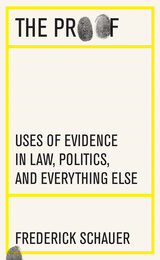
Winner of the Scribes Book Award
“Displays a level of intellectual honesty one rarely encounters these days…This is delightful stuff.”
—Barton Swaim, Wall Street Journal
“At a time when the concept of truth itself is in trouble, this lively and accessible account provides vivid and deep analysis of the practices addressing what is reliably true in law, science, history, and ordinary life. The Proof offers both timely and enduring insights.”
—Martha Minow, former Dean of Harvard Law School
“His essential argument is that in assessing evidence, we need, first of all, to recognize that evidence comes in degrees…and that probability, the likelihood that the evidence or testimony is accurate, matters.”
—Steven Mintz, Inside Higher Education
“I would make Proof one of a handful of books that all incoming law students should read…Essential and timely.”
—Emily R. D. Murphy, Law and Society Review
In the age of fake news, trust and truth are hard to come by. Blatantly and shamelessly, public figures deceive us by abusing what sounds like evidence. To help us navigate this polarized world awash in misinformation, preeminent legal theorist Frederick Schauer proposes a much-needed corrective.
How we know what we think we know is largely a matter of how we weigh the evidence. But evidence is no simple thing. Law, science, public and private decision making—all rely on different standards of evidence. From vaccine and food safety to claims of election fraud, the reliability of experts and eyewitnesses to climate science, The Proof develops fresh insights into the challenge of reaching the truth. Schauer reveals how to reason more effectively in everyday life, shows why people often reason poorly, and makes the case that evidence is not just a matter of legal rules, it is the cornerstone of judgment.

Albert O. Hirschman is renowned worldwide for theories that have been at the forefront of political economics during the last half century. In these twenty essays he casts his sharp analytical eye on his own ideas, questioning and qualifying some of his major propositions on social change and economic development. Hirschman's self-subversion, as well as the self-affirmation that is also present here, reveal the workings of a distinguished mind. They also bring us fresh perspective on the material in his twelve previous books and countless essays.In the substantial essays that open this collection, Hirschman reappraises points he made in such books as Exit, Voice, and Loyalty, The Strategy of Economic Development, and The Rhetoric of Reaction. Subsequent essays fruitfully reexplore the themes of Latin American development and market society that have occupied him throughout his career. Hirschman also forays into new puzzles, such as the likely impact, negative or otherwise, of the Eastern European revolutions of 1989 on the Third World, the on-and-off connections between political and economic progress, and the role of conflict in enhancing community spirit in a liberal democracy.
In a rare and particularly welcome section of the book, Hirschman presents autobiographical fragments that reflect his deep involvement in some of the important events of this century. He recollects his flight from Hitler's Germany in 1933, his studies in Paris, his work with the antifascist underground in Italy in 1937-38, and his role in helping Varian Fry in Marseilles, in 1940, to rescue political and intellectual refugees from Vichy France. Such accounts deepen our understanding of how Hirschman's penetrating insights took shape.
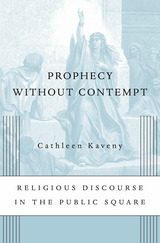
American culture warriors have plenty to argue about, but battles over such issues as abortion and torture have as much to do with rhetorical style as moral substance. Cathleen Kaveny reframes the debate about religion in the public square by focusing on a powerful stream of religious discourse in American political speech: the Biblical rhetoric of prophetic indictment.
“Important and path-breaking. The place of religious discourse in the American public square has received much attention for many years, but the role of prophetic indictment has been largely overlooked. Kaveny’s book not only opens a ‘new front’ in these debates, but starts the conversation with a rich analysis of the history and function of prophetic discourse.”
—Kathleen A. Brady, Commonweal
“A monumental achievement, and a much-needed addition to the academic and societal conversation about the role of religion in public life. In precise prose and with careful analysis, Kaveny challenges some of the leading theorists about public discourse and puts forward her own theories, all accompanied by a storyteller’s gift for anecdote and a philosopher’s talent for explication.”
—Michael Sean Winters, National Catholic Reporter
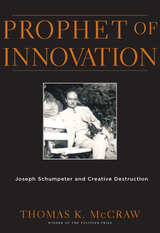
Pan Am, Gimbel’s, Pullman, Douglas Aircraft, Digital Equipment Corporation, British Leyland—all once as strong as dinosaurs, all now just as extinct. Destruction of businesses, fortunes, products, and careers is the price of progress toward a better material life. No one understood this bedrock economic principle better than Joseph A. Schumpeter. “Creative destruction,” he said, is the driving force of capitalism.
Described by John Kenneth Galbraith as “the most sophisticated conservative” of the twentieth century, Schumpeter made his mark as the prophet of incessant change. His vision was stark: Nearly all businesses fail, victims of innovation by their competitors. Businesspeople ignore this lesson at their peril—to survive, they must be entrepreneurial and think strategically. Yet in Schumpeter’s view, the general prosperity produced by the “capitalist engine” far outweighs the wreckage it leaves behind.
During a tumultuous life spanning two world wars, the Great Depression, and the early Cold War, Schumpeter reinvented himself many times. From boy wonder in turn-of-the-century Vienna to captivating Harvard professor, he was stalked by tragedy and haunted by the specter of his rival, John Maynard Keynes. By 1983—the centennial of the birth of both men—Forbes christened Schumpeter, not Keynes, the best navigator through the turbulent seas of globalization. Time has proved that assessment accurate.
Prophet of Innovation is also the private story of a man rescued repeatedly by women who loved him and put his well-being above their own. Without them, he would likely have perished, so fierce were the conflicts between his reason and his emotions. Drawing on all of Schumpeter’s writings, including many intimate diaries and letters never before used, this biography paints the full portrait of a magnetic figure who aspired to become the world’s greatest economist, lover, and horseman—and admitted to failure only with the horses.

To the practical modern mind, the idea of divine prophecy is more ludicrous than sublime. Yet to our cultural forebears in ancient Greece and Rome, prophecy was anything but marginal; it was in fact the basic medium for recalling significant past events and expressing hopes for the future, and it offered assurance that divinities truly cared about mere mortals. Prophecy also served political ends, and it was often invoked to support or condemn an emperor's actions. In Prophets and Emperors, David Potter shows us how prophecy worked, how it could empower, and how the diverse inhabitants of the Roman Empire used it to make sense of their world.
This is a fascinating account of prophecy as a social, religious, and political phenomenon. The various systems of prophecy--including sacred books, oracles, astrological readings, interpretation of dreams, the sayings of holy men and women--come into sharp relief. Potter explores the use of prophecy as a nieans of historical analysis and political communication, and he describes it in the context of the ancient city. Finally, he traces the reformation of the prophetic tradition under the influence of Christianity in the fourth century.
Drawing on diverse evidence--from inscriptions and ancient prophetic books to Greek and Roman historians and the Bible--Potter has produced a study that will engage anyone interested in the religions of the ancient Mediterranean and in the history and politics of the Roman Empire.
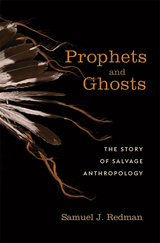
A searching account of nineteenth-century salvage anthropology, an effort to preserve the culture of “vanishing” Indigenous peoples through dispossession of the very communities it was meant to protect.
In the late nineteenth century, anthropologists, linguists, archaeologists, and other chroniclers began amassing Indigenous cultural objects—crafts, clothing, images, song recordings—by the millions. Convinced that Indigenous peoples were doomed to disappear, collectors donated these objects to museums and universities that would preserve and exhibit them. Samuel Redman dives into the archive to understand what the collectors deemed the tradition of the “vanishing Indian” and what we can learn from the complex legacy of salvage anthropology.
The salvage catalog betrays a vision of Native cultures clouded by racist assumptions—a vision that had lasting consequences. The collecting practice became an engine of the American museum and significantly shaped public education and preservation, as well as popular ideas about Indigenous cultures. Prophets and Ghosts teases out the moral challenges inherent in the salvage project. Preservationists successfully maintained an important human inheritance, sometimes through collaboration with Indigenous people, but collectors’ methods also included outright theft. The resulting portrait of Indigenous culture reinforced the public’s confidence in the hierarchies of superiority and inferiority invented by “scientific” racism.
Today the same salvaged objects are sources of invaluable knowledge for researchers and museum visitors. But the question of what should be done with such collections is nonetheless urgent. Redman interviews Indigenous artists and curators, who offer fresh perspectives on the history and impact of cultural salvage, pointing to new ideas on how we might contend with a challenging inheritance.

Prophets and Patrons is the first detailed account of the emergence of sociology and related social sciences in France. It emphasizes three social and intellectual groupings in the period from 1880 to 1914: the social statisticians who grew out of governmental ministries, the Durkheimians who were consistently housed in the university, and the "international sociologists" around René Worms, in neither ministries nor the university.
Unlike most histories of ideas, Prophets and Patrons portrays the institutional developments that encouraged, discouraged, and rechanneled different styles of research. To understand these developments, a sociological analysis of the French university system is presented. At its center are the patrons (generally Sorbonne professors) who served as informal linkages for the entire system. Around them developed clusters of researchers and teachers throughout France. The workings of this system of relations, analyzed here for the first time, are crucial to understanding the French university.
The university is also immersed in the political and ideological currents of the Latin Quarter. Thus Clark's investigation of conflicting elements of French culture and social structure helps illuminate his analysis of the university. This study will be invaluable to social scientists, intellectual historians, and students of French culture and comparative education.

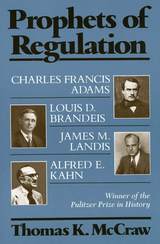



In December 2005, South Africa’s National Prosecuting Authority (NPA) promulgated a controversial policy on the prosecution of apartheid-era crimes, sparking renewed debate about such prosecutions and their role in the transition to democracy since 1994. The book presents a diverse collection of perspectives on prosecutions in South Africa, including a foreword by playwright and actor John Kani. Other reflections from former Truth and Reconciliation Commission (TRC) commissioners, survivors of apartheid, civil society members, and government officials outline the serious questions facing South Africa as it deals with prosecutions today.
The book traces the history of the prosecutions in South Africa including their relationship to the TRC and a recent legal challenge that asserts the NPA policy is an unconstitutional re-run of the TRC amnesty process. Throughout, the book highlights the important themes related to any post-conflict prosecution scheme including rule-of-law concerns, questions of evenhandedness and moral relativism, competing priorities and resource allocation, the limits of a court-centered approach to justice, and the potential transformative power of prosecutions.

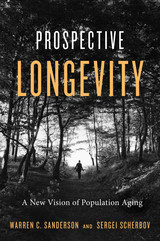
From two leading experts, a revolutionary new way to think about and measure aging.
Aging is a complex phenomenon. We usually think of chronological age as a benchmark, but it is actually a backward way of defining lifespan. It tells us how long we’ve lived so far, but what about the rest of our lives?
In this pathbreaking book, Warren C. Sanderson and Sergei Scherbov provide a new way to measure individual and population aging. Instead of counting how many years we’ve lived, we should think about the number of years we have left, our “prospective age.” Two people who share the same chronological age probably have different prospective ages, because one will outlive the other. Combining their forward-thinking measure of our remaining years with other health metrics, Sanderson and Scherbov show how we can generate better demographic estimates, which inform better policies. Measuring prospective age helps make sense of observed patterns of survival, reorients understanding of health in old age, and clarifies the burden of old-age dependency. The metric also brings valuable data to debates over equitable intergenerational pensions.
Sanderson and Scherbov’s pioneering model has already been adopted by the United Nations. Prospective Longevity offers us all an opportunity to rethink aging, so that we can make the right choices for our societal and economic health.


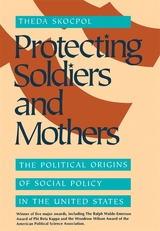
It is a commonplace that the United States lagged behind the countries of Western Europe in developing modern social policies. But, as Theda Skocpol shows in this startlingly new historical analysis, the United States actually pioneered generous social spending for many of its elderly, disabled, and dependent citizens. During the late nineteenth century, competitive party politics in American democracy led to the rapid expansion of benefits for Union Civil War veterans and their families.
Some Americans hoped to expand veterans' benefits into pensions for all of the needy elderly and social insurance for workingmen and their families. But such hopes went against the logic of political reform in the Progressive Era. Generous social spending faded along with the Civil War generation.
Instead, the nation nearly became a unique maternalist welfare state as the federal government and more than forty states enacted social spending, labor regulations, and health education programs to assist American mothers and children. Remarkably, as Skocpol shows, many of these policies were enacted even before American women were granted the right to vote. Banned from electoral politics, they turned their energies to creating huge, nation-spanning federations of local women's clubs, which collaborated with reform-minded professional women to spur legislative action across the country.
Blending original historical research with political analysis, Skocpol shows how governmental institutions, electoral rules, political parties, and earlier public policies combined to determine both the opportunities and the limits within which social policies were devised and changed by reformers and politically active social groups over the course of the late nineteenth and early twentieth centuries.
By examining afresh the institutional, cultural, and organizational forces that have shaped U.S. social policies in the past, Protecting Soldiers and Mothers challenges us to think in new ways about what might be possible in the American future.



This book is a collection of English proverbs, sentences, and proverbial phrases from the Middle Ages. The material is drawn from an exhaustive examination of the surviving texts, mainly printed ones but some still in manuscript. Certain books written later than 1500, usually by authors who were born twenty years or so before the turn of the century, are included, and John Heywood, the first great assembler of English proverbs, is represented by the sayings he compiled.
,"No matter how popular a saying may appear," Mr. Whiting points out in his Preface, "it comes to us at one remove or more from popular usage. The medieval proverbs which survive do so only because they were written down by educated men, none of them collectors from the field. In most cases the sayings were incorporated in literary works by authors who did not hesitate to make changes suggested by context, application, and meter. We sometimes forget that Heywood's Dialogue and Epigrams are poems, although Heywood's standards of prosody are such as to let him use proverbs without too drastic changes for rhyme and rhythm's sake. What we have in most quotations is the proverb, not as an author may have heard or read it, but in the form which suited his immediate convenience or whim."
The sayings are alphabetized by key words and the quotations are in chronological order. Cross-references link sayings of similar import, and the index is a guide to important words other than those by which the alphabetical order is established. References are given to the standard collections of English proverbs, so that the user can trace the later history of many of the sayings.
Filling a long-felt gap in the field, this work will be indispensable to students of Old and Middle English literature and of great value to everyone interested in the rich resources of proverb lore.
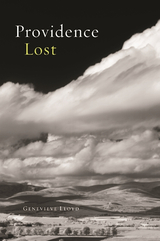
To the ancient Greeks, providence was the inherent purpose and rational structure of the world. In Christian thought, it became a benign will “providing” for human well-being. And in our own ever more secular times—is providence lost? Perhaps, but as Genevieve Lloyd makes clear in this illuminating work, providence still exerts a powerful influence on our thought and in our lives; and understanding how can help us clarify the functioning—or, increasingly, disfunctioning—of concepts of freedom and autonomy that define our modernity. Such an understanding is precisely the goal of this book, which traces a succession of transformations in the concept of providence through the history of Western philosophy.
Beginning with early versions of providence in ancient Greek thought, Lloyd follows the concept through its convergence with Christian ideas, to its role in seventeenth-century philosophical accommodations of freedom and necessity. Finally, she shows how providence was subsumed into the eighteenth-century ideas of progress that eventually rendered it philosophically superfluous. Incorporating rich discussions of thinkers from Euripides to Augustine, Descartes and Spinoza to Kant and Hegel, her lucid and elegantly written work clearly and forcefully brings the history of ideas to bear on our present confusion over notions of autonomy, risk, and responsibility. Exploring the interplay among philosophy, religion, and literature, and among intellect, imagination, and emotion in philosophical thought, this book allows intellectual historians and general readers alike to grasp what it actually means that providence can be lost but not escaped.

This book is about some of the largest events of the twentieth century, about international war, economic collapse, new science and technologies, and about the transformation of an old mill town region into a modern American metropolis. But it sees those sweeping changes through the eyes of fourteen particular Bostonians, in an ambitious attempt to understand the disorienting experiences of recent history. These lives span the years from 1850 to 1980, a time when Boston, like all American cities, was being rebuilt according to the continually changing specifications of science, engineering, mass wealth, and big corporations.
From Boston Brahmins to self-made millionaires, Sam Warner, Jr., brings us into the diverse worlds of Robert Grant, judge and popular novelist; Mary Antin, mystic and advocate for immigrants; Fred Allen, radio comedian; Charles A. Stone and Edwin S. Webster, electrical engineers; Laura Elizabeth Richards, reformist clubwoman; Emily Greene Balch, economist and winner of the Nobel Peace Prize; William Madison Wood, textile magnate; Fred Erwin Beal, socialist labor organizer; Louise Andrews Kent, suburban housewife and writer; Vannevar Bush, science administrator; Laurence K. Marshall, electronics entrepreneur; James Bryant Conant, university president and educational reformer; and Rachel Carson, renowned science writer.
These varied lives have been deftly brought together to illuminate the many contradictory qualifies of today’s metropolitan life: ambitions for education and pervasive social neglect; conspicuous luxuries and endemic poverty; elaborate science and a poisoned environment; far-reaching cooperative networks of strangers and narrow, segregated neighborhoods; the multiplication of women’s roles and the entrapment of women in the home.
Individual experience—how one person lived as a child in a family and in a particular place, how people did their work—can bring renewed insight to the conflicts of modern life. This engrossing story speaks from an urge to recapture history through human lives and to examine its meaning as authentic experience. As Alfred Kazin expresses it, we are a nation of men and women who have endeavored to escape traditions, and therefore self-discovery is our preoccupation and delight.

It is commonly agreed that the history of France at the end of the eighteenth century was influenced powerfully, at times decisively, by collective interests and group actions. Yet, as Philip Dawson shows, this consensus has been the foundation of endless scholarly argument over the purposes of group actions and their effects on economic, political, and intellectual life, the accuracy of facts reported, the validity of different methods of analysis, and the significance of the whole topic for previous and subsequent human experience. In probing these questions, this monograph contributes research findings to the historical controversy over the political motives and conduct of the upper bourgeoisie during the French Revolution.
Chosen for study is a well-defined occupational group near the pinnacle of the bourgeoisie, the 2700 judicial officeholders in the bailliages and sénéchaussées--royal courts from which appeals were taken to the parlements. These lower-court magistrates were generally well-to-do and esteemed personages in the provincial bourgeoisie, who could potentially be drawn to either side in a political struggle between nobility and bourgeoisie. They constituted more than 20 percent of the bourgeois representation in the Estates General of 1789. Revolutionary legislation abolished their offices, but many of them remained active in politics even under the revolutionary republic.
Dawson makes use of a variety of manuscript materials pertinent to the magistrates as he treats their activities as members of corporate groups before 1790 and follows many of them as individuals through the revolutionary years to 1795. In part, the book is based on biographical data relating to 230 magistrates--all who were in office in the provinces of Burgundy and Poitou at the outbreak of the revolution.
By the end of 1789, the author concludes, most of the magistrates came to accept revolutionary change because alternative courses of action had been made more unacceptable to them. It was their support that helped to make possible the revolutionary process itself. "They were not the leaders of the revolutionary bourgeoisie. Before 1789, they had been in the highest rank of the bourgeoisie and they remained a notable part of it, but most of them had come to support revolution hesitantly, cautiously, with moderation and many a backward glance."
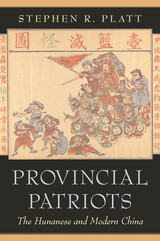
From the Taiping Rebellion in the mid-nineteenth century to the Chinese Communist movement in the twentieth, no province in China gave rise to as many reformers, military officers, and revolutionaries as did Hunan. Stephen Platt offers the first comprehensive study of why Hunan wielded such disproportionate influence.
Covering a span of eight decades, this book portrays three generations of Hunanese scholar-activists who held their provincial loyalties above their allegiances to a questionable Chinese empire. The renaissance of Hunan centered around the revival of Wang Fuzhi, a local hermit scholar from the seventeenth century whose iconoclastic writings were deemed a remarkable match for "Western" ideas of progress, humanism, and nationalism. Advocates of reform and revolution thus framed their projects as the continuance of a local tradition--the natural destiny of the Hunanese people--creating a tradition of reform and nationalism that culminated in the 1920s with a Hunanese independence movement led by the young Mao Zedong.
By putting provincial Hunan at the center of this narrative, Platt uncovers an unexpected and surprising story of modern China that sheds light on the current resurgence of regionalism in the country.

Kokugaku, or nativism, was one of the most important intellectual movements from the seventeenth through the nineteenth century in Japan, and its worldview continues to be influential today. This scholarly endeavor represented an attempt to use Japanese antiquity to revitalize what many saw as a society in decline. One important figure in this movement was Hirata Atsutane (1776-1843), a center of controversy in his own lifetime. Even though Atsutane's version of nativism came to be the standard form, many modern scholars dismiss him because of his scholarly shortcomings.
The primary goal of this book is to restore historicity to the study of nativism by recognizing Atsutane's role in the creation and perpetuation of an intellectual tradition that remains a significant part of Japanese history and culture. Arguing that conflict among scholars and intellectuals begets ideas, Mark McNally shows that nativism was rife with internal competition. The mid-nineteenth-century suppression of this multiplicity of views led to the emergence of what we now think of as "nativism." By focusing on the competition among the rival strands of nativism, McNally demonstrates that nativism resulted not from Atsutane's conscious attempt to formulate a new intellectual tradition but from his greater political skills at putting his views across.

Spirited verse.
Prudentius (Aurelius Prudentius Clemens) was born in AD 348 probably at Caesaraugusta (Saragossa) and lived mostly in northeastern Spain, but visited Rome between 400 and 405. His parents, presumably Christian, had him educated in literature and rhetoric. He became a barrister and at least once later on an administrator; he afterwards received some high honor from Emperor Theodosius. Prudentius was a strong Christian who admired the old pagan literature and art, especially the great Latin poets whose forms he used. He looked on the Roman achievement in history as a preparation for the coming of Christ and the triumph of a spiritual empire.
The Loeb Classical Library edition of the poems of Prudentius is in two volumes. Volume I presents: “Preface” (Praefatio); “The Daily Round” (Liber Cathemerinon); twelve literary and attractive hymns, parts of which have been included in the Breviary and in modern hymnals; “The Divinity of Christ” (Apotheosis), which maintains the Trinity and attacks those who denied the distinct personal being of Christ; “The Origin of Sin” (Hamartigenia) attacking the separation of the “strict” God of the Old Testament from the “good” God revealed by Christ; “Fight for Mansoul” (Psychomachia), which describes the struggle between (Christian) Virtues and (Pagan) Vices; and the first book of “Against the Address of Symmachus” (Contra Orationem Symmachi), in which pagan gods are assailed.
The second volume contains the second book of “Against the Address of Symmachus,” opposing a petition for the replacement of an altar and statue of Victory; “Crowns of Martyrdom” (Peristephanon Liber), fourteen hymns to martyrs mostly of Spain; “Lines To Be Inscribed under Scenes from History” (Tituli Historiarum), forty-nine four-line stanzas that are inscriptions for scenes from the Bible depicted on the walls of a church; and an Epilogue.

Spirited verse.
Prudentius (Aurelius Prudentius Clemens) was born in AD 348 probably at Caesaraugusta (Saragossa) and lived mostly in northeastern Spain, but visited Rome between 400 and 405. His parents, presumably Christian, had him educated in literature and rhetoric. He became a barrister and at least once later on an administrator; he afterwards received some high honor from Emperor Theodosius. Prudentius was a strong Christian who admired the old pagan literature and art, especially the great Latin poets whose forms he used. He looked on the Roman achievement in history as a preparation for the coming of Christ and the triumph of a spiritual empire.
The Loeb Classical Library edition of the poems of Prudentius is in two volumes. Volume I presents: “Preface” (Praefatio); “The Daily Round” (Liber Cathemerinon); twelve literary and attractive hymns, parts of which have been included in the Breviary and in modern hymnals; “The Divinity of Christ” (Apotheosis), which maintains the Trinity and attacks those who denied the distinct personal being of Christ; “The Origin of Sin” (Hamartigenia) attacking the separation of the “strict” God of the Old Testament from the “good” God revealed by Christ; “Fight for Mansoul” (Psychomachia), which describes the struggle between (Christian) Virtues and (Pagan) Vices; and the first book of “Against the Address of Symmachus” (Contra Orationem Symmachi), in which pagan gods are assailed.
The second volume contains the second book of “Against the Address of Symmachus,” opposing a petition for the replacement of an altar and statue of Victory; “Crowns of Martyrdom” (Peristephanon Liber), fourteen hymns to martyrs mostly of Spain; “Lines To Be Inscribed under Scenes from History” (Tituli Historiarum), forty-nine four-line stanzas that are inscriptions for scenes from the Bible depicted on the walls of a church; and an Epilogue.


Struminski's study concentrates on text-critical, biographical, and linguistic aspects of the Speech in order to demonstrate that the original (no longer extant) was in Ukrainian and that it was an actual speech delivered at the Warsaw Diet, not a parody of such a speech as has been assumed. The author has discovered hitherto unknown copies of the text and archival materials concerning the historical Meleško. With the use of this data Struminski was able to build a stemma for the interrelationship of the extant copies and to reconstruct the archetype of the text.
Further, the author has established little known facts of Meleško's life and connected them with the origin of the Speech. The study concludes with a full glossary to the text, with translation of all foreign words into English.
The work will be useful to experts and students in the field of Slavic languages and literature.

The Psyche and Schizophrenia offers a remarkably clear and comprehensive treatment of biopsychosocial development and psychotic processes. This extraordinary work lays the theoretical foundation for understanding the relationships between feeling and thinking (affect and logic) in normal as well as in pathological conditions, especially schizophrenia. Ciompi's affective-cognitive theory integrates interpersonal, familial, and social interactions with intrapsychic mental structures and yields startling new insights into the origins of "schizophrenic alienation." While Ciompi acknowledges the important role that genetic and biological models play in schizophrenia, he maintains that it is largely the psychosocial factors that determine long-term prognosis. Thus, The Psyche and Schizophrenia elaborates a number of new therapeutic approaches to the management of biological as well as environmental influences.
Drawing upon Piaget, Freud, and systems theory, as well as advanced current research, Ciompi develops a new model of the normal and pathological functioning of the psyche. This model presents cognition and emotion, the structure of logic and the dynamics of affects, as a complementary system governed by "ubiquitous laws of equilibrium."
In this brilliant synthesis of theoretical and empirical research, Ciompi proposes his novel theory of an "affectlogic" that probes the affective structures of logic as well as the logical structures of the emotions. Original in its conception and elegantly written, The Psyche and Schizophrenia is a major contribution to research on schizophrenia, and its penetrating insights and thorough analysis are sure to enrich the field of psychiatry for years to come.

READERS
Browse our collection.
PUBLISHERS
See BiblioVault's publisher services.
STUDENT SERVICES
Files for college accessibility offices.
UChicago Accessibility Resources
home | accessibility | search | about | contact us
BiblioVault ® 2001 - 2024
The University of Chicago Press



